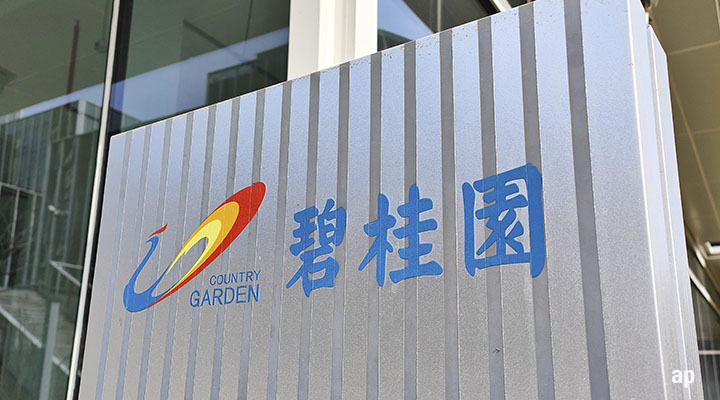
Country Garden (02007) shares lost 18% on the stock market on Monday after Chinese real estate developer at the weekend suspended trading in several bonds.
Since the start of the year, the company's stock, which is listed in Shanghai and Shenzhen, has fallen 70%.
Morgan Stanley lowered its recommendation on the value to “underweight”, highlighting increased risks of deterioration in liquidity which “could lead to a default in the short term. This could further deteriorate the value of the company's assets and its operations and take years to rectify the situation.”
The news weighed on Chinese equity markets at the start of the week and the yuan has returned to November 2022 lows.
Country Garden is a privately owned real estate giant that is listed among the Forbes 500 largest companies in the world.
Its boss, Yang Huiyan, was until recently the richest woman in Asia.
In 2022, the company achieved a turnover of nearly £52 billion, compared to £4.48 billion in 2012, and generated a loss of £736 million.
On the stock market, Country Garden withstood the difficulties encountered by China Evergrande in 2021, before experiencing a first significant stock market correction in 2022, which it partly overcame at the end of the year.
The group, which has long been deemed to be financially sound, was unable to make interest payments on two offshore bonds on August 7.
Country Garden has a 30-day grace period and risks default in September if it doesn't pay.
According to market sources, the company has engaged leading investment bank CICC bank to prepare the financial restructuring of its financial debts, amounting to £31 billion at the end of 2022.
Like Evergrande, Country Garden going bankrupt would have catastrophic repercussions on the Chinese financial system and economy, which is already struggling to regain a more sustained growth dynamic after years of zero-COVID policy. President Joe Biden described China as a “ticking time bomb” amid a run of poor data and fears the country may be entering a period of deflation.
Country Garden already issued a profit warning on August 10, anticipating a net loss of around 45 to 55 billion yuan (between £4.8 and £6 billion) for the first six months of the year 2023 (against a profit of 1.91 billion yuan for the same period of the previous year).
"Since 2021, the industry has entered an unprecedented difficult period with multiple adverse factors, resulting in severe difficulties and challenges for industry sales and open market financing," Country Garden said in a statement.
The company invites its shareholders to "carefully" read the press release which will accompany its half-year results at the end of August.
The Morningstar View - Analyst Jeff Zhang
We have cut our fair value estimate for Country Garden Holdings to HKD 1.20 from HKD 2.80 given the higher weighted average cost of capital on potential defaults and more compressed margins. CGH missed a $22.5 million interest payment on two offshore bonds on August 7, fuelling the market's concerns that it may eventually default after the 30-day grace period as evidenced by the plunge in its bond and share prices.
While management cited liquidity pressure due to a deterioration in sales and the refinancing environment, they underscored an ongoing effort to arrange coupon payments. That said, we remain cautious about the likelihood of CGH’s default, given its weak sales and elevated overseas funding costs. As such, we raised our assumptions for CGH’s cost of debt and cost of equity by 550 basis points and 200 basis points, respectively, leading to WACC rising to 12.8% from 9.5%, according to our prior estimate. In addition, following CGH’s profit warnings, we think pressured housing prices in lower-tier cities have further eaten into CGH’s profitability and lowered our 2023 gross margin forecast to 6.1% from 9.9%.
We think CGH’s missing offshore interest payment may not be an isolated event given its worsened liquidity status currently compared with the end of 2022. For the first half of 2023, the firm’s attributable sales value has tumbled by over 30% year on year, adding to the pressure on operating cashflow. Also, CGH’s overseas financing on the debt and equity front has been muted since 2023, implying that the firm has likely used its cash denominated in foreign currencies. Aside from coupon payments due in August, we estimate that CGH needs to fulfill at least $137 million of bond interest payments through the rest of 2023.
Without additional credit support from Chinese regulators and sizeable financial institutions, CGH should continue to see an elevated risk of defaulting on its overseas debt, in our view.
Another negative for CGH is that management expected net losses for the first half of 2023, mainly due to a gross margin decline, inventory impairment increase, and foreign-exchange losses. CGH remains heavily exposed to projects in lower-tier cities, which we do not believe will see a material sales improvement due to depressed homebuying sentiment.
While the firm has not massively acquired land parcels in the first half, we forecast that most of its existing projects should post lower margins given faltering selling prices and the tempered pace of turnover. The recent credit event may further dent homebuyers’ confidence in CGH’s ability to promptly deliver presold projects, in our view. Hence, we revise our long-term margin assumptions and foresee CGH delivering an 8.0% gross margin in 2027 versus 15.0% previously.
Note published on August 10





























